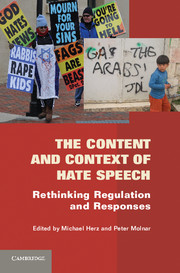Book contents
- Frontmatter
- Contents
- Contributors
- Foreword: Hate Speech and the Coming Death of the International Standard before It Was Born (Complaints of a Watchdog)
- Foreword: Hate Speech and Common Sense
- Acknowledgments
- Introduction
- Part I Overviews
- Part II Refinements and Distinctions
- Part III Equality and Fear
- Part IV International Law
- Index
Foreword: Hate Speech and the Coming Death of the International Standard before It Was Born (Complaints of a Watchdog)
Published online by Cambridge University Press: 05 June 2012
- Frontmatter
- Contents
- Contributors
- Foreword: Hate Speech and the Coming Death of the International Standard before It Was Born (Complaints of a Watchdog)
- Foreword: Hate Speech and Common Sense
- Acknowledgments
- Introduction
- Part I Overviews
- Part II Refinements and Distinctions
- Part III Equality and Fear
- Part IV International Law
- Index
Summary
This collection of cutting-edge writing on hate speech is also a documentation of our day's passionate debate on democracies’ free speech governance, a debate that not only reflects the change underway but also drives it forward. It is two changes in one, in fact. While concern over hate speech has grown from separate national anxieties into a global issue, the trend as to the preferred way of handling hate speech has gravitated toward restricting it by regulation rather than isolating it by more reasoned speech.
Both these approaches are defended in superbly crafted arguments in the present volume. The prize the authors want you to keep your eyes on are two very different “minimums.” Proponents of keeping governments to a “minimal regulation” standard are powerfully rebutted by advocates of “extensive regulation” who believe, in Michel Rosenfeld's words, that “the state can no longer justify commitment to neutrality” and that it has a duty to “strive for maintenance of a minimum of mutual respect” and “secure a minimum of civility in the public arena.”
This is enjoyable intellectual fencing, but it should not blind us to the surprising hazards that the dispute represents for the global advocacy arena, quite apart from the question of which approach is best suited to handle hate speech.
- Type
- Chapter
- Information
- The Content and Context of Hate SpeechRethinking Regulation and Responses, pp. xiii - xviiiPublisher: Cambridge University PressPrint publication year: 2012
- 7
- Cited by



